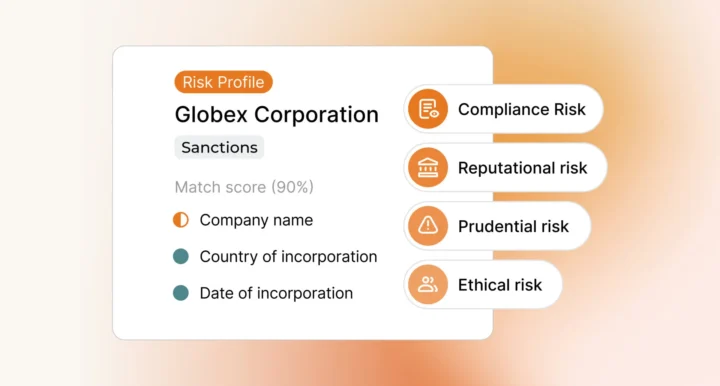Following widespread legislative reforms, the Asia-Pacific (APAC) region has seen an increase in financial crime investigations in recent years. While geopolitical events such as the Covid-19 pandemic and the global supply chain crisis slowed anti-money laundering (AML) and counter-financing of terrorism (CFT) efforts in 2021 and 2022, APAC AML regulations will continue to evolve in 2023, and compliance teams should prepare for change.
From the emerging risks of cryptocurrency and digital assets, to new global economic sanctions, the Asia-Pacific region’s financial risk landscape is diverse. To help your organisation stay ahead of its obligations, and address criminal threats, let’s explore some of the most notable AML changes from key APAC regulators.
Singapore
The Monetary Authority of Singapore (MAS) is a regional leader in financial crime enforcement, and regularly announces initiatives to combat financial crime in Singapore and beyond. In October 2022, MAS announced its National Strategy for Countering the Financing of Terrorism, a five-pronged plan for addressing the misuse of Singapore’s financial system for terrorism financing. The plan calls for greater coordination between law enforcement agencies and international counterparts, and sets out the following key priorities:
- Coordinated, comprehensive risk identification, emphasising cooperation between government agencies.
- Strong legal and sanctions enforcement frameworks, matched to international AML/CFT standards.
- Risk-based supervision, matched to international standards and best practices.
- Greater inter-agency law enforcement cooperation to ensure decisive action against terrorism financiers.
- Continuous implementation of international CFT standards set by organisations such as the Financial Action Task Force (FATF) and the United Nations Security Council (UNSC).
In support of its inter-agency cooperation objectives, MAS announced the roll-out of its Collaborative Sharing of ML/TF Information & Cases (COSMIC) platform, which is scheduled for implementation in 2023. Co-created by 6 major international banks, COSMIC will facilitate information sharing between organisations in Singapore, with a focus on shell company abuse, illicit trade finance, and weapons proliferation.
Hong Kong
Hong Kong’s primary financial regulator, the Hong Kong Monetary Authority (HKMA) has stated that its priorities for 2023 include tackling fraud and the use of mule accounts to launder money. Its 2022 Risk Assessment report set the money laundering risk to the banking sector at “High”, with fraud as the principal threat.
In order to address fraud, and other AML/CFT risks, the HKMA is continuing efforts to promote wider adoption of AML technology. Those efforts include its Fintech 2025 strategy, which includes a range of initiatives to promote information sharing between financial institutions, such as the launch of the Commercial Data Interchange (CDI).
In 2023, the HKMA has identified the following supervisory priorities:
- Prudential work: Health checks on non-bank financial institutions.
- Technology: Continuing promotion of fintech adoption and a focus on cybersecurity and third-party risk management.
- AML risk: Data-driven supervision, regulatory updates, information sharing, and an analytic focus on mule account networks.
- Consumer protection: Investor protection for virtual assets, enhanced protection for credit card services, mandatory reference checking.
China
China’s regulatory scrutiny of money laundering activities increased in 2022 following a significant rise in money laundering convictions between 2016 and 2019. The Chinese government launched its three year action plan to crack down on money laundering in 2022. Led by the People’s Bank of China (PBOC) and the Ministry of Public Security, the plan sets out new coordination and consultation requirements between government departments in order to target money laundering, and includes proposals for new risk prevention mechanisms, AML training programmes, and solutions for the analysis of money laundering typologies.
China’s focus on AML/CFT follows its fourth-round Mutual Evaluation Report by the FATF. As part of its efforts to implement FATF requirements, China clarified its customer due diligence (CDD) rules, and extended those rules to non-banking payment institutions, loan companies, financing firms, and other types of financial service providers.

Japan
Following the FATF’s Mutual Evaluation Report of Japan in August 2021, the Japanese government published its action plan for compliance. The FATF’s main criticism of Japan’s AML/CFT framework was a lack of understanding of risk in certain financial institutions. Accordingly, the action plan requires Japanese financial institutions to improve their risk assessment and risk mitigation measures, and to ensure the efficacy of their ongoing CDD measures.
Japan’s Financial Services Agency (FSA) also identified fintech advances as a source of AML/CFT risk, suggesting that regulatory action will be forthcoming in 2023. The FSA highlighted the risks of crypto-assets, artificial intelligence algorithms, and even “deepfake” videos as potential risk factors and suggested that Japan’s financial institutions should leverage digital tools to enhance the effectiveness of their AML/CFT countermeasures.
With that challenge in mind, Japan has been focusing on new cryptocurrency regulations. In September 2022, the government announced that it would be amending the Act on Prevention and Transfer of Criminal Proceeds in order to extend the FATF’s Travel Rule reporting requirement to cryptocurrency and stablecoin transactions.
Australia
In 2021, the Australian government launched an inquiry into the adequacy and efficacy of Australia’s anti-money laundering and counter-terrorism financing (AML/CTF) regime. The inquiry identified an ongoing financial crime risk from Designated Non-Financial Businesses & Professions (DNFBPs) such as real estate agents, casinos, gambling companies and lawyers, which had not been brought into the scope of certain AML/CFT reforms. As a result of that failure, criminals had used Australian DNFBPs to launder billions of dollars, enabling criminal activities and networks across APAC.
The inquiry recommends that the Australian Transaction Reports and Analysis Centre (AUSTRAC) extend its AML/CFT reporting rules to DNFBPs, encourage financial institutions to integrate technology as part of their risk-based AML/CFT frameworks, and better align its AML/CFT regulations with international standards. As part of that effort, Australia announced plans for the introduction of a new beneficial ownership registry in November 2022: the registry will aid law enforcement efforts in tracking down foreign money launderers that exploit the country’s financial system.
APAC AML Regulations: How Technology Can Help
APAC is a complex and challenging AML landscape, and firms that do business across the region must be ready to manage a diversity of regulatory obligations. While certain trends, such as the focus on digital asset regulation, reflect the global financial situation, national concerns, such as Australia’s DNFBP crisis, require a localised response.
To understand risk exposure in this environment and avoid regulatory compliance penalties, firms must be able to collect and analyse data at scale, with speed and accuracy. Ripjar’s Labyrinth Screening platform was designed with that objective in mind, enabling firms to search customer names in real time against thousands of adverse media stories, sanctions lists, and watchlists. Integrating machine learning technology, Labyrinth helps firms extract meaningful data from a spectrum of structured and unstructured sources, and adapt quickly to the changing regulatory requirements of jurisdictions across APAC and the world.
To discuss how Ripjar can help you with AML compliance in APAC, get in touch
Last updated: 3 February 2025





